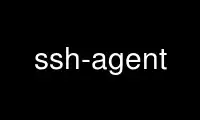
This is the command ssh-agent that can be run in the OnWorks free hosting provider using one of our multiple free online workstations such as Ubuntu Online, Fedora Online, Windows online emulator or MAC OS online emulator
PROGRAM:
NAME
ssh-agent — authentication agent
SYNOPSIS
ssh-agent [-c | -s] [-Dd] [-a bind_address] [-E fingerprint_hash] [-t life]
[command [arg ...]]
ssh-agent [-c | -s] -k
DESCRIPTION
ssh-agent is a program to hold private keys used for public key authentication (RSA, DSA,
ECDSA, Ed25519). ssh-agent is usually started in the beginning of an X-session or a login
session, and all other windows or programs are started as clients to the ssh-agent program.
Through use of environment variables the agent can be located and automatically used for
authentication when logging in to other machines using ssh(1).
The agent initially does not have any private keys. Keys are added using ssh(1) (see
AddKeysToAgent in ssh_config(5) for details) or ssh-add(1). Multiple identities may be
stored in ssh-agent concurrently and ssh(1) will automatically use them if present.
ssh-add(1) is also used to remove keys from ssh-agent and to query the keys that are held in
one.
The options are as follows:
-a bind_address
Bind the agent to the UNIX-domain socket bind_address. The default is
$TMPDIR/ssh-XXXXXXXXXX/agent.<ppid>.
-c Generate C-shell commands on stdout. This is the default if SHELL looks like it's a
csh style of shell.
-D Foreground mode. When this option is specified ssh-agent will not fork.
-d Debug mode. When this option is specified ssh-agent will not fork and will write
debug information to standard error.
-E fingerprint_hash
Specifies the hash algorithm used when displaying key fingerprints. Valid options
are: “md5” and “sha256”. The default is “sha256”.
-k Kill the current agent (given by the SSH_AGENT_PID environment variable).
-s Generate Bourne shell commands on stdout. This is the default if SHELL does not
look like it's a csh style of shell.
-t life
Set a default value for the maximum lifetime of identities added to the agent. The
lifetime may be specified in seconds or in a time format specified in
sshd_config(5). A lifetime specified for an identity with ssh-add(1) overrides this
value. Without this option the default maximum lifetime is forever.
If a command line is given, this is executed as a subprocess of the agent. When the command
dies, so does the agent.
The idea is that the agent is run in the user's local PC, laptop, or terminal.
Authentication data need not be stored on any other machine, and authentication passphrases
never go over the network. However, the connection to the agent is forwarded over SSH
remote logins, and the user can thus use the privileges given by the identities anywhere in
the network in a secure way.
There are two main ways to get an agent set up: The first is that the agent starts a new
subcommand into which some environment variables are exported, eg ssh-agent xterm &. The
second is that the agent prints the needed shell commands (either sh(1) or csh(1) syntax can
be generated) which can be evaluated in the calling shell, eg eval `ssh-agent -s` for
Bourne-type shells such as sh(1) or ksh(1) and eval `ssh-agent -c` for csh(1) and
derivatives.
Later ssh(1) looks at these variables and uses them to establish a connection to the agent.
The agent will never send a private key over its request channel. Instead, operations that
require a private key will be performed by the agent, and the result will be returned to the
requester. This way, private keys are not exposed to clients using the agent.
A UNIX-domain socket is created and the name of this socket is stored in the SSH_AUTH_SOCK
environment variable. The socket is made accessible only to the current user. This method
is easily abused by root or another instance of the same user.
The SSH_AGENT_PID environment variable holds the agent's process ID.
The agent exits automatically when the command given on the command line terminates.
In Debian, ssh-agent is installed with the set-group-id bit set, to prevent ptrace(2)
attacks retrieving private key material. This has the side-effect of causing the run-time
linker to remove certain environment variables which might have security implications for
set-id programs, including LD_PRELOAD, LD_LIBRARY_PATH, and TMPDIR. If you need to set any
of these environment variables, you will need to do so in the program executed by ssh-agent.
Use ssh-agent online using onworks.net services
